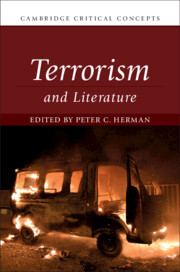The go-to guy for an understanding of the ways in which terrorism has been represented in literature is Peter C. Herman, author of Terrorism and Literature (Cambridge University Press, 2018) and Unspeakable: Literature and Terrorism from the Gunpowder Plot to 9/11 (Routledge, 2019).


Although his scope is broader than the early modern period, he devotes a lot of attention to it. The central pillar of Herman’s analysis is the paradox of terrorism as something that both speaks – “To the perpetrators, terrorism has a precise and clear message” – and is unspeakable: “To its victims, the terrorist act is so horrible it defies language”. He traces “the origin of this paradigm” to the Gunpowder Plot (“A deed without a name”: Macbeth, the Gunpowder Plot, and terrorism, March 2014, Journal for Cultural Research 18[2]:114-131).

